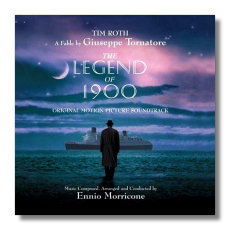
The Internet's Premier Classical Music Source
Related Links
- Latest Reviews
- More Reviews
-
By Composer
-
Collections
DVD & Blu-ray
Books
Concert Reviews
Articles/Interviews
Software
Audio
Search Amazon
Recommended Links
Site News
 CD Review
CD Review
The Legend of 1900

Original Motion Picture Soundtrack by Ennio Morricone
Gilda Buttà, Amedeo Tommasi, piano
Roger Waters, vocals
Edward Van Halen, guitar
Accademia Musicale Italiana/Ennio Morricone
Sony Classical SK66767 DDD 67:39
This Italian film, released in 1998, was originally known as "The Legend of the Pianist on the Ocean," which might sound better in Italian than in English! The film is a "fable" by director Giuseppe Tornatore, and it tells the story of a man nicknamed 1900, after the year of his birth. 1900 is born on a cruise ship, the Virginian, not much different than the Titanic. He develops into a virtuoso pianist, and masters many styles of playing. He manages even to beat the great Jelly Roll Morton at his own game. The Virginian is 1900's entire physical and emotional world, and when the ship's life comes to an end, 1900 refuses to leave it, and literally dies with the ship. I have not seen the film, but I understand that it has become a cult favorite among those who respond to millennial nostalgia.
Millennial nostalgia is something that Ennio Morricone can do very well. Also, because he is nothing if not eclectic, he was the right man to choose for such a wide-ranging story. Three of the 21 tracks on this disc are co-written by pianist Tommasi, and the CD also includes "The Crave" by Jelly Roll Morton and "Peacherine Rag" by Scott Joplin. Many of the tracks naturally feature the piano, and Buttà and Tommasi respond well to the score's elegiac moods. Some of these are presented in a blues style, and others in a more classical style. The main theme, which belongs to 1900 itself, is a typical bit of memorable Morriconiana, but the composer spices it up with piano interjections that wouldn't be out of place in Rhapsody in Blue. Overall, this score makes for very pleasant listening, although it is nowhere near being one of Morricone's most distinctive. The biggest surprise, and it's pleasant, is the final track ("Lost Boys Calling"). Here, vocalist Roger Waters (Pink Floyd) and guitarist Edward – no "Eddie," please! – Van Halen (from the band of the same name) collaborate with Morricone on a song that savvy radio programmers might pick up and succeed with. Waters's touchingly vulnerable voice sells the lyric (also by Waters), and the guitar solos by Van Halen show – if there was any question – what a fine musician he is. I don't know what "Lost Boys Calling" has to do with the film, if anything, but it brings the CD to an unusual and positive close.
The booklet contains a collage of stills and some production credits, but no information at all about the film or Morricone's music. This is unfortunate, because this is the sort of CD that sells mostly to people who care about such things. The sound quality is fine, if rather "studio-y"
Copyright © 2000, Raymond Tuttle



















